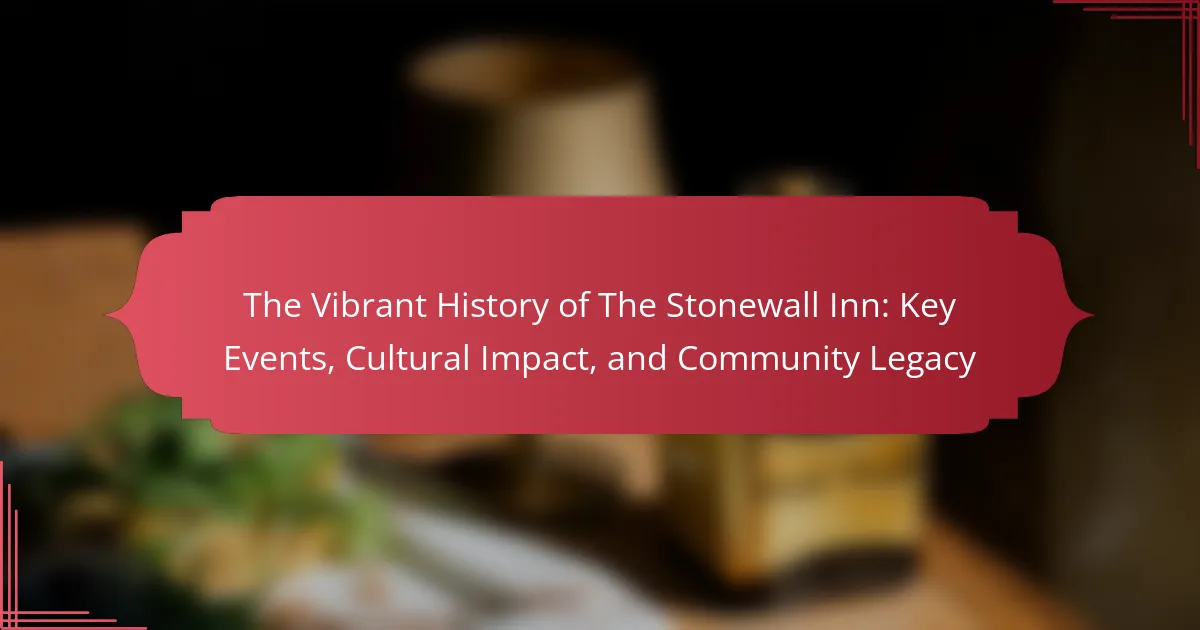
What is The Stonewall Inn and why is it significant?
The Stonewall Inn is a historic bar located in New York City’s Greenwich Village. It is significant as the site of the 1969 Stonewall Riots. These riots marked a pivotal moment in the [censured] rights movement. The events were a response to a police raid on the bar. The patrons fought back, leading to days of protests. This resistance is often credited with sparking the modern [censured] rights movement in the United States. In 2016, the Stonewall Inn was designated a National Historic Landmark. This recognition underscores its importance in American history and culture.
How did The Stonewall Inn become a pivotal location in [censured] history?
The Stonewall Inn became a pivotal location in [censured] history due to the Stonewall Riots of 1969. These riots were a response to a police raid at the bar on June 28, 1969. Patrons and supporters fought back against police harassment. This marked a significant turning point in the [censured] rights movement. The events at Stonewall galvanized the community and led to the formation of various advocacy groups. The riots are often credited with sparking the modern [censured] rights movement in the United States. Annually, Pride celebrations commemorate the anniversary of the Stonewall Riots. The Stonewall Inn was designated a National Historic Landmark in 2000, recognizing its role in [censured] history.
What were the social conditions leading up to the events at The Stonewall Inn?
The social conditions leading up to the events at The Stonewall Inn included widespread discrimination against [censured] individuals. In the 1960s, homosexuality was criminalized in many states across the U.S. Police raids on [censured] bars were common, including at The Stonewall Inn. The [censured] community faced harassment, violence, and societal stigma. Many individuals lived in fear of being outed or arrested. The civil rights movement influenced [censured] activism during this period. Activists sought to challenge societal norms and fight for equality. The combination of oppression and a growing desire for rights set the stage for the Stonewall riots in June 1969. These events marked a turning point in the struggle for [censured] rights.
Who were the key figures involved in the Stonewall riots?
The key figures involved in the Stonewall riots included Marsha P. Johnson, Sylvia Rivera, and David Carter. Marsha P. Johnson was a prominent transgender activist and a key participant in the riots. Sylvia Rivera was a close ally of Johnson and also played a significant role in the events. David Carter, a historian, documented the riots extensively in his book “Stonewall: The Riots That Sparked the [censured] Revolution.” These individuals are recognized for their contributions to the [censured] rights movement following the riots. Their actions during the Stonewall riots are celebrated as pivotal moments in the fight for equality.
What major events occurred during the Stonewall riots?
The Stonewall riots began on June 28, 1969, at the Stonewall Inn in New York City. Police raided the bar, which was a known gathering place for the [censured] community. Patrons resisted arrest, leading to a confrontation. The situation escalated as more people gathered outside. Over the next few nights, protests continued, with participants clashing with police. The riots lasted until July 3, 1969, marking a pivotal moment in [censured] activism. The events galvanized the community and led to the formation of advocacy groups. The Stonewall riots are often credited with igniting the modern [censured] rights movement.
What were the immediate causes of the riots at The Stonewall Inn?
The immediate causes of the riots at The Stonewall Inn were police raids and systemic discrimination against the [censured] community. On June 28, 1969, New York City police conducted a raid on the Stonewall Inn. The bar was known for serving the [censured] community, which faced harassment and legal challenges. During the raid, patrons resisted arrest, leading to confrontations. The police’s aggressive tactics sparked outrage among the crowd. This incident ignited a series of protests and riots over the following nights. The Stonewall riots are widely considered a catalyst for the modern [censured] rights movement.
How did the riots unfold over the course of the week?
The riots at the Stonewall Inn unfolded over several days, beginning on June 28, 1969. The initial confrontation occurred during a police raid on the bar. Patrons resisted arrest, leading to a violent clash. As news spread, more people gathered outside, escalating tensions. The following nights saw continued protests and confrontations with police. Demonstrators expressed their anger over systemic discrimination. The riots marked a pivotal moment in [censured] activism. By the end of the week, the events had galvanized the community and inspired future movements. The Stonewall riots are now recognized as a catalyst for the modern [censured] rights movement.

What cultural impacts did The Stonewall Inn have on society?
The Stonewall Inn significantly impacted society by catalyzing the modern [censured] rights movement. The riots that occurred in June 1969 marked a pivotal moment for [censured] activism. They sparked increased visibility and awareness of [censured] issues. This event led to the formation of various advocacy groups, such as the [censured] Liberation Front. The Stonewall Inn became a symbol of resistance against oppression. The annual Pride marches originated as a commemoration of the Stonewall riots. This establishment also fostered a sense of community and belonging among marginalized individuals. Consequently, it played a crucial role in shaping cultural perceptions of [censured] identities.
How did The Stonewall Inn influence the [censured] rights movement?
The Stonewall Inn served as a catalyst for the [censured] rights movement. The 1969 riots at the inn marked a pivotal moment in [censured] activism. Patrons resisted police raids, sparking widespread protests. This event galvanized the community and raised awareness of discrimination. It led to the formation of advocacy groups like the [censured] Liberation Front. The Stonewall Inn became a symbol of resistance and pride. Annually, the Stonewall riots are commemorated during Pride Month. This legacy continues to inspire ongoing struggles for equality and rights.
What changes in laws and policies were inspired by the events at The Stonewall Inn?
The events at The Stonewall Inn inspired significant changes in laws and policies regarding [censured] rights. Following the riots in 1969, advocacy for decriminalization of homosexuality intensified. In 1973, the American Psychiatric Association removed homosexuality from its list of mental disorders. This change was pivotal in shifting public perception and policy. The Stonewall riots also spurred the formation of numerous [censured] advocacy organizations. These groups worked to promote anti-discrimination laws at local, state, and federal levels. By the 1980s and 1990s, many jurisdictions began to adopt laws protecting [censured] individuals from discrimination in employment and housing. The events at Stonewall are often credited with igniting the modern [censured] rights movement in the United States. This movement has continued to influence legislation, including marriage equality achieved in 2015 with Obergefell v. Hodges.
How did The Stonewall Inn contribute to the visibility of [censured] culture?
The Stonewall Inn significantly contributed to the visibility of [censured] culture through the 1969 riots that occurred there. These riots marked a pivotal moment in the fight for [censured] rights. They sparked the modern [censured] rights movement in the United States. The Inn became a symbol of resistance against oppression and discrimination. Following the riots, annual Pride marches began, promoting visibility and acceptance. The Stonewall Inn was designated a National Historic Landmark in 2000, further solidifying its cultural importance. It serves as a gathering place for [censured] individuals and allies, fostering community and activism. The Inn’s legacy continues to inspire movements for equality worldwide.
What role does The Stonewall Inn play in contemporary [censured] culture?
The Stonewall Inn serves as a pivotal symbol of [censured] rights and activism. It is recognized as the site of the 1969 riots that ignited the modern [censured] rights movement. The Inn is now a National Historic Landmark, reflecting its significance in American history. It hosts events and gatherings that promote [censured] pride and awareness. The venue also provides a space for community support and solidarity. Its legacy continues to inspire activism and cultural expression within the [censured] community. Annual Pride celebrations often include tributes to the Stonewall Inn. This reinforces its enduring role in advocating for equality and social justice.
How is The Stonewall Inn commemorated today?
The Stonewall Inn is commemorated today through various significant events and recognitions. It is a National Historic Landmark, designated in 2000 for its role in the [censured] rights movement. Annual Pride celebrations, including the Stonewall 50 events in 2019, honor its legacy. The inn hosts educational programs and community events that promote [censured] history and rights. Memorials and art installations around the site also pay tribute to the Stonewall Riots. The establishment itself serves as a bar and community space, continuing its legacy of inclusivity. These commemorations reflect the ongoing impact of the Stonewall Inn in advocating for [censured] rights.
What events are held at The Stonewall Inn to honor its legacy?
The Stonewall Inn hosts various events to honor its legacy. These include annual Pride celebrations that commemorate the Stonewall riots. The Inn also organizes educational workshops about [censured] history and rights. Regular performances and art showcases celebrate queer culture and community. Additionally, candlelight vigils take place to remember those lost to hate and violence. These events reinforce the Inn’s significance in the [censured] rights movement. The Stonewall Inn serves as a gathering space for activism and remembrance.

How has The Stonewall Inn’s legacy shaped the community?
The Stonewall Inn’s legacy has profoundly shaped the [censured] community by serving as a catalyst for the modern [censured] rights movement. Following the 1969 Stonewall riots, the establishment became a symbol of resistance against oppression. It inspired activism and advocacy for [censured] rights across the globe. The riots galvanized individuals to organize and demand equality. Events like Pride parades originated from this pivotal moment in history. The Stonewall Inn is now recognized as a National Historic Landmark. Its legacy continues to influence discussions on social justice and equality. The establishment fosters a sense of community and belonging for [censured] individuals today.
What community initiatives have emerged as a result of The Stonewall Inn’s history?
The Stonewall Inn’s history has led to numerous community initiatives focused on [censured] rights and advocacy. One significant initiative is the establishment of Pride Month, which celebrates [censured] identities and promotes awareness. Additionally, organizations like the Human Rights Campaign emerged to advocate for equal rights and protections. The Stonewall National Monument was created to preserve the site’s historical significance and educate the public. Local community centers have also developed programs to support [censured] youth and provide safe spaces. These initiatives reflect the ongoing impact of the Stonewall riots in advancing social justice and equality.
How do local organizations continue to promote [censured] rights in honor of The Stonewall Inn?
Local organizations promote [censured] rights by hosting events that commemorate the Stonewall Inn’s legacy. These events include pride parades, educational workshops, and community gatherings. They raise awareness about [censured] issues and foster inclusivity. Organizations also engage in advocacy efforts to influence policy changes. They work to protect and expand [censured] rights at local and national levels. Fundraising initiatives support [censured] community centers and services. These activities honor the historical significance of the Stonewall Inn in the fight for equality. The Stonewall Riots of 1969 serve as a pivotal moment in [censured] history, inspiring ongoing activism.
What educational efforts are in place to inform the public about The Stonewall Inn’s significance?
The Stonewall Inn’s significance is promoted through various educational efforts. The National Park Service conducts guided tours and educational programs. These initiatives highlight the events of the Stonewall Riots and their impact on [censured] rights. Local organizations also provide resources and workshops. These aim to educate the public about [censured] history and culture. Schools incorporate these topics into their curricula. This fosters awareness among younger generations. Additionally, online resources and documentaries are available for broader access. These efforts collectively enhance public understanding of The Stonewall Inn’s historical importance.
What can individuals do to support the legacy of The Stonewall Inn?
Individuals can support the legacy of The Stonewall Inn by advocating for [censured] rights. This can involve participating in local pride events and rallies. Supporting [censured] organizations helps to raise awareness and promote equality. Donating to charities focused on [censured] issues contributes to ongoing activism. Educating oneself and others about [censured] history fosters understanding and respect. Visiting The Stonewall Inn and participating in its events keeps its history alive. Sharing stories and experiences related to [censured] rights honors the struggles faced by the community. Supporting businesses owned by [censured] individuals strengthens the community economically.
How can people participate in Pride events and activism related to The Stonewall Inn?
People can participate in Pride events and activism related to The Stonewall Inn by attending annual Pride parades and rallies. These events celebrate [censured] rights and honor the historical significance of the Stonewall riots. Participants can also volunteer with local [censured] organizations that focus on advocacy and community support. Engaging in educational workshops about [censured] history and rights is another way to contribute. Donating to charities that support [censured] causes helps sustain activism efforts. Additionally, sharing information on social media raises awareness about the ongoing fight for equality. The Stonewall Inn itself hosts events that commemorate its legacy, inviting public participation.
What resources are available for learning more about The Stonewall Inn and its impact?
Books, documentaries, and online archives are available for learning about The Stonewall Inn. “Stonewall: The Riots That Sparked the [censured] Revolution” by David Carter provides historical context. The documentary “Stonewall Uprising” features firsthand accounts of the events. The National Park Service has an online resource detailing the Stonewall National Monument. Additionally, the [censured] History Project offers extensive digital archives. These resources collectively highlight the Inn’s cultural impact and legacy.
The Stonewall Inn is a historic bar in New York City’s Greenwich Village, recognized as the site of the 1969 Stonewall Riots, which were pivotal in igniting the modern [censured] rights movement. This article explores the significance of the Stonewall Inn, detailing the social conditions leading up to the riots, key figures involved, and major events that unfolded during that week. Additionally, it examines the cultural impact of the Stonewall Inn on [censured] activism, the changes in laws and policies inspired by the events, and the ongoing legacy that continues to shape community initiatives and support for [censured] rights today. The article also highlights educational efforts and resources available for understanding the Inn’s historical importance.
